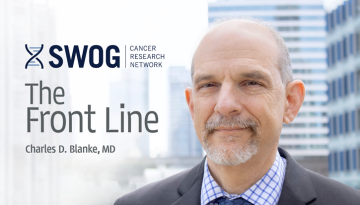SWOG Hits SABCS with High-Impact Research
SWOG Cancer Research Network members will share results of five network-led studies at the San Antonio Breast Cancer Symposium, or SABCS, an international gathering of breast cancer researchers expected to draw 8,000 virtual attendees from more than 80 countries that runs Dec. 8-11.
One trial led by SWOG, a cancer clinical trials group funded by the National Cancer Institute (NCI), part of the National Institutes of Health, will be the focus of a press conference held Tuesday, Dec. 8 at 12 noon Central Time. Kevin Kalinsky, MD, a long-time SWOG investigator and director of the Glenn Family Breast Center at the Winship Cancer Institute of Emory University, will present early results from S1007, a trial known as RxPONDER. SWOG, the NCI, and the American Association for Cancer Research, a sponsor of SABCS, will release details after the press event.
“There is a lot for SWOG to celebrate about the work we’re sharing,” said Lajos Pusztai, MD, PhD, chair of SWOG's breast cancer committee and professor of medicine at Yale University and director of Breast Cancer Translational Research and co-director of the Cancer Center Genomics, Genetics, and Epigenetics program at Yale Cancer Center. “All of our SABCS results will advance breast cancer science and medicine, and one will change practice.”
Here are summaries of other presentations on SWOG trials at the symposium:
- Shane Stecklein, MD, PhD, a physician, translational scientist and assistant professor at the University of Kansas Cancer Center, will deliver results of S9313. This study investigated whether molecular information from triple negative breast cancer patients – including homologous recombination deficiency (HRD) status and DNA damage immune response (DDIR) signature – can be used to predict treatment response. He and his SWOG team found that dual classification by DDIR and HRD status does identify immune-dependent and immune-independent prognostic groups and that patients with poor expected outcomes have distinctive tumor characteristics. These insights will inform trials testing immunotherapy and DNA damaging therapy, alone or in combination, in triple negative breast cancer patients. Stecklein’s oral slide presentation takes place Thursday, December 10 at 10 a.m. Central Time.
- Lynn Henry, MD, PhD, lead of the breast oncology program at University of Michigan Rogel Cancer Center, is an expert in understanding the pain associated with aromatase inhibitor (AI) treatment for breast cancer. Up to half of AI-treated patients experience significant joint pain, a condition known as AI-Associated Musculoskeletal Syndrome, or AIMSS, which can be so severe that up to 30 percent of women stop taking their medication. Henry and her team studied data from three SWOG studies testing AIMSS treatments – S0927, S1202, and S1200 – to see if they could identify predictors of pain reduction. They found that patients with AIMSS who have fewer symptoms and better functional status at the time of trial enrollment are more likely to experience meaningful pain reduction in intervention trials, suggesting early intervention for treating AIMSS may be important. Henry’s spotlight poster presentation takes place Friday, December 11 at 3:30 p.m. Central Time.
- Costanza Paoletti, MD, is a former research investigator at University of Michigan Rogel Cancer Center who will present findings that show serum testing in hormone receptor positive metastatic breast cancer patients could be a predictor of response to endocrine therapy. Analyzing samples from S0226, Paoletti and her team looked at the presence of thymidine kinase 1 (TK1), which plays a key role in DNA synthesis and is a marker of cellular proliferation, in serum samples at baseline, or prior to endocrine treatment, and at several timepoints throughout the study to see if sTK1 levels predict treatment response. They found high sTK1 levels were associated with worse prognosis in hormone receptor positive MBC patients starting first-line endocrine treatment. Their data also showed that patients with low sTK1 at baseline may do relatively well on single agent treatment and may not need combination therapy. Paoletti’s presentation is part of Poster Session 2.
- Ko Un “Clara” Park, MD, an assistant professor of surgical oncology at The Ohio State University, will present results of a survey on the impact of COVID on treatment of early stage estrogen receptor positive breast cancer. Results, based on responses from 114 physicians from 29 states, showed that most providers changed their management of patients by using neoadjuvant endocrine therapy until surgery could proceed. As the duration of this treatment was extended, more physicians reported favoring axillary lymph node dissection in low volume axillary disease. Park’s presentation is part of a special session on COVID, to be held Tuesday, Dec. 8 at 10:15 a.m. Central Time.
Stecklein’s work was funded by the National Cancer Institute through grants CA180888 and CA180819, and in part by Amgen.
Henry’s work was funded by the National Cancer Institute through grant CA189974 and in part by The Hope Foundation for Cancer Research.
Paoletti’s work was funded by the National Cancer Institute through grants CA180888, CA180819, CA196175; and in part by AstraZeneca. Biovica funded the TK1 testing.
Park’s work was funded by the National Cancer Institute through grant CA180888.
Other Recent Stories



